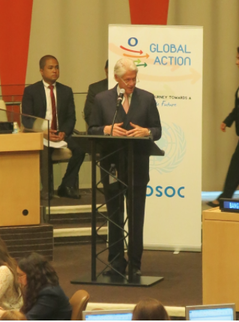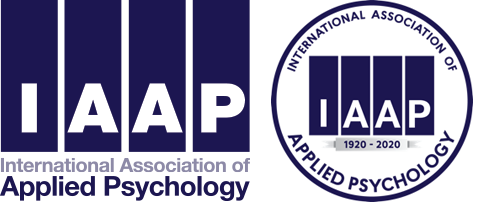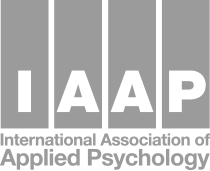IAAP UN Team Report: Economic and Social Council 2015 Annual Partnerships Forum
Partnership, together with People, Planet, Prosperity and Peace, constitutes one of the five overarching themes – referred to as the "Five Ps" – around which the Post-2015 Development Agenda has been formulated. Indeed, the Preamble to the outcome document set for formal adoption by all 193 Member States at the UN Summit in September 2015 underlines the importance of “all countries and all stakeholders, acting in collaborative partnership...to take the bold and transformative steps needed to shift the world onto a sustainable and resilient path.” Partnership is thus identified as one of the five pillars underpinning international efforts to ensure that “no one will be left behind.”
In this context, the recent ECOSOC Partnerships Forum held at UN headquarters in New York on 28 May, entitled ‘The role of Partnerships in Achieving the Post-2015 Development Agenda: Making it Happen’, could hardly have been more timely. The forum, convened in the ECOSOC Chamber, brought together a wide range of stakeholders from government, the UN system, business, philanthropic foundations, civil society, and academia. Over the course of two sessions, panels of experts from diverse backgrounds engaged in discussions centered around two topics. These were ways in which multi-stakeholder partnerships can: (1) promote human resources for health in settings of poverty, with special emphasis on the ongoing Ebola recovery efforts in West Africa and lessons learned from the outbreak; and (2) support the implementation of the Post-2015 Development Agenda, including through lessons learned from MDG partnerships, opportunities for creating new initiatives, and monitoring progress. This forum was the latest chapter in ECOSOC’s ongoing theme for 2015: ‘Managing the transition from the Millennium Development Goals to the Sustainable Development Goals: What it will take.’
The morning session, focusing on ‘Partnerships in support of strengthening health systems: Building resilience to pandemics’ was of particular interest to Dr. Judy Kuriansky, UN NGO Representative for IAAP and Chair of the Psychology Coalition of NGOs accredited at the UN, and her team of four assistants (Joel Zinsou, Paul Harrington, Monica Kim, and Mariama Jalloh) in attendance. The promotion of resilience, as well as mental health and wellbeing, has been the primary objective of Dr. Judy’s advocacy efforts at the UN - efforts which have seen these crucially important issues being incorporated into the Post-2015 Agenda.
The session featured a panel including: Dr. Anthony Fauci, Director of the US National Institute of Allergy and Infectious Diseases; Dr. Matshidoshi Rebecca Moeti, WHO Regional Director for Africa; Gary M. Cohen, President of Global Health for the medical technology company Becton, Dickinson and Company; Jeffrey Wright, Actor, and Founder of the Ebola Surivival Fund; and Dr. Rifat Atun, Professor of Global Health Systems at Harvard University. The dialogue was moderated by Dr. Paul Farmer, Special Advisor to the UN Secretary-General on Community-Based Medicine and Lessons Learned from Haiti, chairman of Harvard Medical School’s Department of Global Health and Social Medicine, and founding director of Partners In Health.

Panelists and attendees gather in the UN ECOSOC Chamber for the Annual Partnerships Forum
Welcoming remarks were delivered by H.E. Mr. Martin Sajdik, President of ECOSOC, who stated that “This is the moment to partner for the sake of sustainability.” He described the meeting’s objective “to bring even more fresh thinking and even more new ideas into the discussion on how we can harness the broadest range of actors in support of the new development objectives we are about to create.” Ambassador Sajdik also highlighted the valuable role ECOSOC is playing as the “partner of partners” in establishing a platform for the global review of partnerships, through its coordination and oversight of the UN system, ensuring that partnerships are aligned with the goals of the Post-2015 Agenda.
Commenting on the situation in West Africa, Sajdik noted that the Ebola outbreak had exposed “existing deficiencies” in basic health services as well as in emergency response capabilities across the subregion - deficiencies that undermined the resilience of the three most-affected countries: Liberia, Sierra Leone and Guinea. “To help solve complex health issues such as Ebola,” he remarked, “new alliances and partnerships are necessary in order to better address the critical and often systemic gaps in health, especially when tackling the many social and economic dimensions of the epidemic.” Recognizing the presence of several leading experts in global health, he stressed the need to concentrate efforts on ensuring that the investments made in fighting Ebola so far will translate into long-term health gains and building resilience to pandemics. Ultimately, he said, the goal must be to promote self-sufficiency across the region through national capacity-building efforts.
In the opening address, UN Deputy Secretary-General Jan Eliasson reminded the assemblage that 2015 marks the 70thanniversary of the founding of the UN, noting that “we are possibly living through the most challenging period since the creation of this Organization.” In the face of numerous uncertain global challenges, not the least of which is the Ebola epidemic, Ambassador Eliasson remarked, one certainty was that “no single entity – no single nation or organization – can solve the problems alone.” Reinforcing Ambassador Sajdik’s insistence on the need for inclusive multi-stakeholder partnerships at all levels – local, national, regional and global – going forward, he called for “a new model for problem-solving” in the context of the Post-2015 Agenda. “We need to put the problems at the center and mobilize all actors to achieve effective change,” he asserted. “We have to move from the vertical ‘silo’ approach to the horizontal, crosscutting one.”
In introducing former US President Bill Clinton as the forum's keynote speaker, Mr. Sajdik pointed out that he “needs no introduction at The UN.” The founder of the Clinton Global Initiative, which facilitates partnerships to implement innovative solutions to the world’s most pressing challenges, stressed the crucial role of partnerships in advancing the Post-2015 Development Agenda, and imparted practical wisdom from his foundation’s experience in dealing with the Ebola crisis.

Pictured from left to right: Former US President Bill Clinton; UN Deputy Secretary-General, Mr. Jan Eliasson; ECOSOC President, H.E. Mr. Martin Sajdik
Clinton commented on the extent of the devastation wrought by Ebola in the preceding eighteen months. “Our friends in West Africa have survived a fate that most people could never imagine,” he remarked, noting that “communities have been torn apart not only by disease but still sadly by stigma against people who survived.” Given that the IAAP team at the UN, led by Dr. Kuriansky, has sought to raise awareness of this lingering psychosocial fallout from the epidemic through its advocacy efforts, it was reassuring to hear the former President including it in the conversation.
He went on to elaborate on the need to harness the power of partnerships to deliver more resilient health systems. This need was highlighted by the Ebola outbreak, which exposed the fragility of the existing health systems in the three worst-hit countries. The problem of fragile infrastructure had left these nations ill-equipped to contain the spread of the virus and to deliver basic health services in areas such as maternal and child care – and would do so again in the future, unless the issue was adequately addressed.
Years ago, when planning to get projects off the ground, the questions asked were “What are you looking to do?” and “How much money will it cost?” Now, said Mr. Clinton, an added question is “How will this get done?” This “how question” – that would address the above-mentioned systemic weaknesses – can only be answered through the establishment of strong multi-stakeholder partnerships. This requires a shift in focus from emergency response to long-term investment in healthcare systems – a transition, he emphasized, that “will not happen unless there are money, time, material, knowledge and skills contributed by governments, business, philanthropists and NGOs."
“Many hands do lighten the load,” he remarked.
Clinton used the opportunity to appeal to donors to refrain from pressurizing the Ebola-affected countries into presenting short-term, ‘quick fix’ recovery plans as opposed to the multi-year plans they had recently outlined. “Over the long run,” he stated, “the health of the world depends on people being able to take care of themselves,” adding that “the best projects are often those that have a diverse group of partners that have the explicit purpose of empowering their host nations to one day not need them anymore because they can handle their own affairs.” He cited the fruitful partnership between his own Clinton Health Access Initiative (CHAI) and Dr. Farmer’s Partners In Health (PIH) non-profit organization, and the successes achieved by their collaborative efforts to rebuild health systems in Rwanda in the years following that country’s genocide, as an example of how strategies aimed at empowering indigenous health workers through capacity-building initiatives at the national level are the most effective and “economically sensible” way of bringing about lasting improvements.

Mr. Clinton delivered the forum's keynote address
These health system-strengthening efforts had been bolstered by the involvement of 23 partners, he noted, with generous funding provided by the President's Emergency Plan For AIDS Relief (PEPFAR). A similarly galvanized response is now required to deliver the resilient health systems necessary to aiding the full recovery of West Africa and its people. As far as funding is concerned, Mr. Clinton suggested that 15% of all donor community contributions over the course of the next three to seven years should be ring-fenced for building these much-needed health systems.
Above all, he reiterated, it is essential to acknowledge that “what [the affected countries] want and deserve is the ability to stand on their own.”
In his remarks as moderator, Dr. Farmer echoed Clinton’s sentiments on the importance of engaging all relevant stakeholders to forge inclusive and cooperative partnerships, in moving “from aid to accompaniment” in the approach to post-Ebola recovery. Also like the former President, Farmer singled out the ongoing progress being made by Rwanda’s Human Resources for Health (HRH) Program as an example of how concerted efforts built around long-term (i.e. seven-year) investment can deliver meaningful systemic change.
A case in point is the program’s rural equity agenda, which Farmer noted has posted the sharpest decline in mortality rates ever recorded over the past decade. A similar multi-year approach to capacity-building in post-Ebola West Africa would help to prevent some of the “visual field defects” that have served to hinder similar recovery initiatives, he argued. In the context of Ebola, he pointed out that such defects might include a tendency to ignore the threat posed by other diseases, like measles and malaria, as well as a failure to work together in rural areas. Oversights such as these would only serve to undermine the move towards reaching and staying at zero cases across the subregion.
The forum also featured statements (delivered via video link) from the health ministers of Liberia, Guinea and Sierra Leone. Liberia’s Dr. Bernice Dahn noted that “the word ‘resilience’ has become a global household word since the outbreak of Ebola in West Africa” (an important message for the IAAP membership and psychosocial support professionals worldwide), and that the epidemic had “highlighted the importance of, and generated an interest in, having a resilient healthcare system across the globe.” Defining a resilient healthcare system as “the capacity of health actors, institutions and populations to effectively respond to crisis and maintain core functions when a crisis hits,” Dr. Dahn identified such resilience-building as a crucial strategy needed to support Sustainable Development Goal 3, which states: “Ensure healthy lives and promote well-being for all at all ages.” She added that at the forefront of her country’s nascent investment plan is the building-up of “a resilient, well-motivated health workforce that can also withstand shock,” while also underlining the importance of national ownership going forward.

Mr. Clinton underlined the importance of building strong multi-stakeholder partnerships by stating that "Many hands do lighten the load"
Guinea’s Health Minster Remy Lamah outlined his country’s new post-Ebola recovery programme (scheduled for 2015 until 2024), as well as its national health development programme (for 2015 until 2017), which address the serious problem that the outbreak had stretched the healthcare system to the limit due to a lack of resources, particularly in remote areas. Resilience-building would have to be prioritized in the areas of strengthened laboratories and technical equipment, as well as improved staff training, to ensure the system becomes proactive rather than just reactive.
The Deputy-Minister for Health and Sanitation of Sierra Leone, Ms. Madina Rahman, voiced concern at what she perceived to be the premature withdrawal of international partners from her country. Despite only one remaining positive case of Ebola in her country now, she nevertheless warned against complacency, and stressed that the work needed to get to and stay at zero cases could not be done alone. Insisting that “we need all hands on deck,” she reminded everyone that “it only took one case for us to get to the position that we are in right now.”
Also joining the forum via video link, WHO Regional Director for Africa, Dr. Matshidoshi Rebecca Moeti, echoed the call made by other speakers for broad-based multi-stakeholder partnerships. She further underscored the need for financing to be provided in an integrated manner across the Ebola-hit region, similar to efforts during the HIV/AIDS epidemic. She highlighted the “need to take a leap of faith” to provide financing capable of delivering resilient healthcare systems through investment in vital ‘building blocks’ such as human resources and information systems. Reiterating Mr. Clinton’s advice to allow the affected countries the time needed to implement multi-year recovery plans, she urged all partners to understand that “you cannot simply turn around a system that is extremely weak in its present form overnight.”
In a discussion among the panelists and attendees, consensus was reached on a central matter of importance: namely, that all partnerships formed – irrespective of whether they focus on Ebola recovery – should be aligned with the goals of the Post-2015 Development Agenda in order to achieve results. President of Global Health at Becton, Dickinson and Company, Gary Cohen, explicitly focused on the role of flexible public-private partnerships in the ongoing recovery effort. In particular, he suggested that a number of innovative financing options – including blended finance, corporate social responsibility, impact investing and social impact bonds – could be made available by the private sector to help facilitate this process.
Submitted by Paul Harrington, IAAP UN intern

